The 2018 Italian Elections
Which topics dominated digital public discourse in the 2018 Italian Elections?
Data & Analysis
Statistics
The dataset is made out of 3 separate corpora, corresponding to each candidate’s Facebook posts and comment section. A separate corpus - used for comparison - merges together all posts and comments for the respective period.
More specifically, the dataset gathered all comments on the politicians’ Facebook pages from one month before the election - that is, from February 2018 to the beginning of March 2018. In total, there are ~800,000 comments on 488 posts.
The above bar graph demonstrates that the number of comments corresponds to the results of the elections and respectively to the popularity of the candidates. The posts by the far-right Northern League Matteo Salvini invited the largest number of comments (~356,000), followed by Luigi Di Maio from the anti-establishment Five Star Movement with ~277,000. In contrast, Renzi’s posts only accumulated ~160,000 comments. This, however, may be due to the lower number of posts on his Facebook page (88 posts versus 200 for Salvini and Di Maio).
Analysis - Topic Modelling
Thanks to the topic modelling script, we managed to detect the topics who has been discussed the most through comments on the Facebook page of Matteo Renzi, Luigi di Maio and Matteo Salvini. For each visualization, we kept the relevance metric λ at the value 0.5. In the following paragraphs we will analyse each topic for each candidate, in order to show the nature of the online discussions over the Italian elections.
MATTEO RENZI – Democratic Party
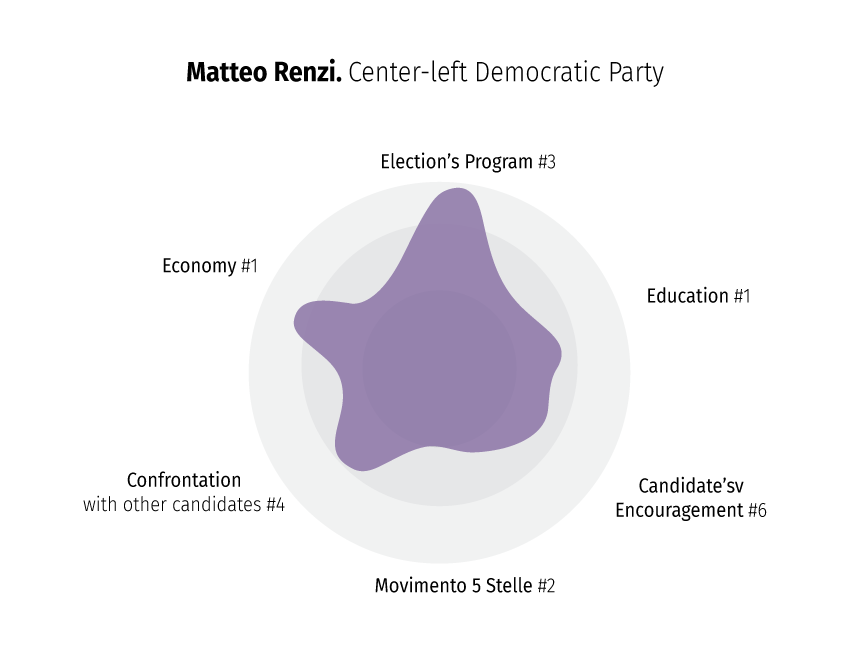
The most discussed topics on Matteo Renzi’s Facebook page through comments were the following: Economy, Movimento 5 Stelle, the Election’s Program, Confrontation with other candidates, Candidate’s Encouragement and Education. We will now analyze each one of them, specifically.
-
Economy (topic 1): The first topic that we found is related to the economy. The most used word for this category was “job”, followed by “years”, “money”, “euro”, “young people”, “taxes”, “80”, “income”, “salary”, “security”, “secure”, “retirement”, “public” and “pay”. This list of words shows the concerns of the Italians towards their economic situations and the past and future reforms. As we will see with the other candidates as well, the concerns about retirement (due to the reform made by Elsa Fornero, the former minister of Labor during Monti’s government) is at the center of many discussions in the Facebook comments. Moreover, it makes sense that, on Renzi’s page, people will discuss over the 80 euros benefit per month that he promised to lower income workers. Taxes and young people’s unemployment are also part of the issues that has been raised online. The concerns about these topics can be explained by the fact that 31.5% of the younger population is unemployed.
-
Movimento 5 Stelle (topic 2): The second topic that emerged from the Facebook comments was the 5 Stars Movement. Due to the high engagement and activity of the party’s members online, this fact is not shocking. In particular, considering that the 5 Stars Movement received the majority of the votes as a political party, the users interest is understandable. The words that formed this category are: “5”, “stars”, “m5s”, “south”, “5stars”, “to vote”, “movement”, “five”, “5s”, “votes”, “they vote” and “Italians”. What is interesting to see is that, among the most used words of this topic, there is “south”. The 5 stars movement, in fact, triumphed in the southern regions of Italy during the elections.
-
The Election’s Program (topic 3): As a third topic we found that the Facebook comments showed concern about Renzi’s elections program. Words such as “to do”, “done”, “without”, “government”, “Italians” and “country” are some of the few words that could be linked to the “100 points” program of Renzi. Most relevant words include such as “to do”, “done” and “government” refers to those things the party had done when it was governing.
-
Confrontation with other candidates (topic 4): Another category of comments was focused on other political figures, in comparison with Matteo Renzi. The most common words were in fact “Minniti”, “Maio”, “words”, “Salvini”, “Politics”, “De” (as in De Luca), “Referendum”, “confrontation”, “Luca”, “we want”, “facts”. This topic clearly refers to other political figures that had confronted Matteo Renzi. The first one is Marco Minniti, the Minister of Interior and member of Democratic Party. He has been quite critical of the party and he insisted several times that he approved Renzi’s decision to resign after the Constitutional Referendum. The names of the two other candidates that we are analyzing are also among the most used words in this category. Finally, “De Luca”, as Vincenzo De Luca, president of the Region Campania and member of the Democratic Party, was also among the cited politicians.
-
Candidate’s Encouragement (topic 6): As for every candidate, one topic of the discussion is the Encouragement to the candidate. The users often use the comment sections to post slogans and support. In this category, we found the following words: “great”, “PD”, “Renzi”, “team”, “live”, “vote”, “leader”, “let’s go”, “great (pl.)”, “to win”, “we will win”, “true” and “grullini”. While the majority of the words were positive and in support of the candidate, it is interesting to notice “grullini”, a mix in between “Grillini” (the name given to the members of the Five Stars Movement, because of its leader Beppe Grillo) and “Grullo” (fool or idiot, in Italian). This shows that even if the users were supporting the candidate, they will also try to diminish and attack the opposition.
-
Education (topic 8): The last topic that we found among the comments on Renzi’s page is Education. The words that link to this topic are “school”, “people”, “amazing”, “well”, “best, “teachers”, “culture” and “ignorant”. This comments on Renzi’s page are mainly related to his previous School Reform, called “Riforma della Buona Scuola”. Overall, the comments seem positive and supportive.
LUIGI DI MAIO – Five Stars Movement
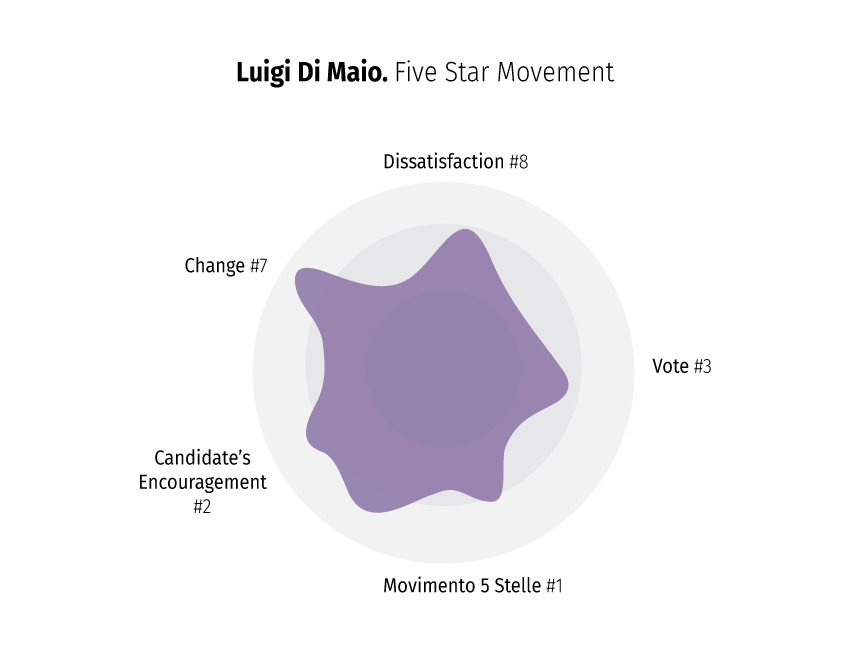
The five topic that came out in the comment section of Luigi Di Maio’s Facebook page were the following: Movimento 5 Stelle, Candidate’s Encouragement, Vote, Change and Dissatisfaction. As we will see, these topics are very traditional of the Five Star Movement. The party has often based its rhetoric on the urgency to change the Italian political system, which is at the core of the lack of satisfaction of the Italians.
-
Movimento 5 Stelle (topic 1): The first topic that we found among the comments on Di Maio’s Facebook page is about its party. The main words in this category are the following “5”, “stele”, “m5s”, “movimento”, “great”, “vote”, “five”, “honesty”, “to vote”, “we will win”, “family”, “salvation”. These words shows that the active members on Di Maio’s page support not only the candidate, but the party as well. In particular, it is important to notice words such as “honesty”, “family” and “salvation” that are linked to it: the party has often presented itself as an opposition to the corrupted and fragmented Italian political elite. Furthermore, the use of online tools to organize the party’s activities and debates has probably made the supporters and the members of the party more active on Facebook.
-
Candidate’s Encouragement (topic 2): As second topic we found the encouragement to Di Maio himself. As we have seen, this topic is existing for each candidate, since Facebook comments are often used for expressing support to the candidate through slogans. The words in this category are: “great”, “luigi”, “maio”, “president”, “go”, “bravo”, “gigi”, “compliments”, “amazing”, “unique”, “we believe”, “adore” and “strong”. All of these words shows positive support to the candidate
-
Vote (topic 3): The third topic from the comments on Di Maio’s Facebook page are related to the urgency to vote. Since the 5 Stars Movement was not part of any coalition, it was fundamental for them to receive at least 30% of the votes in order to obtain enough representation. For this reason, the comments are often referring to the necessity to vote on the 4th of March. In this category we can find words such as “March”, “4”, “we have to”, “win”, “us”, “to vote”, “vote”, “go”, “strong”, “Sunday”, “wm5s”.
-
Change (topic 7): The Five Star Movement has often opposed itself to the Italian political scene, perceived as old and corrupted. It is not out of the blue that one of the topic’s on Di Maio’s Facebook page would be related to change. The words that represent this need of change in the Italian political system are the following: “Italians”, “I hope”, “country”, “to change”, “future”, “people”, “children”, “hope”, “Italy”, “good”, “people”, “young”, “Italy”, “change”, “finally”, “Italian”, “years”, “trust”, “let’s vote”.
-
Dissatisfaction (topic 8): The last topic among the comments is the feeling of dissatisfaction with the current political elite and the Italian situation. The topic includes names of political figures (“Berlusconi”, “Renzi” and “Salvini”), as well as words with a sense of dissatisfaction and will to act (“promises”, “years”, “need”, “let’s take back” “possibilities”). The topic included also references to the electoral law: “votes”, “electoral”, “law” and “campaign”.
MATTEO SALVINI – Northern League
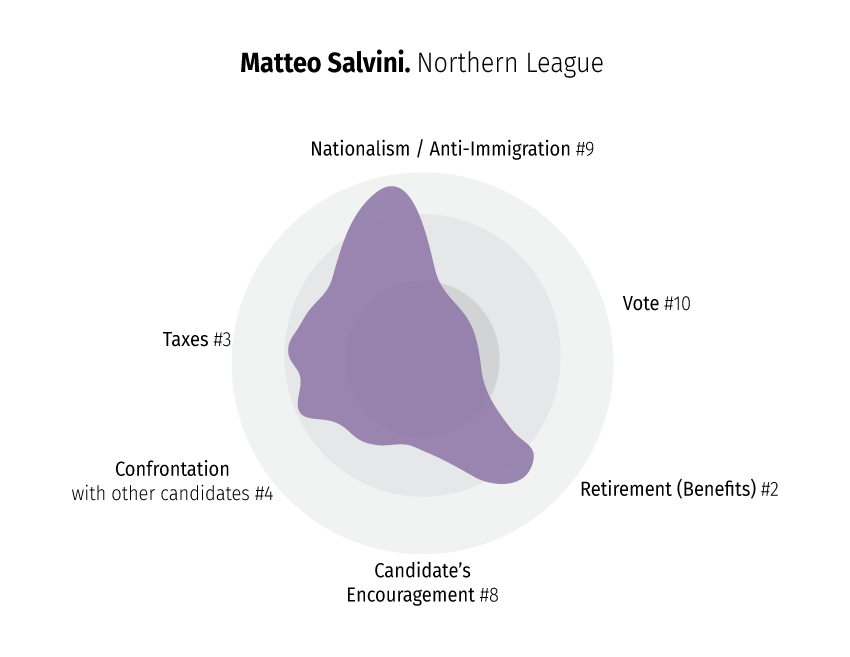
In the case of Matteo Salvini, the candidate for the Northern League party, we found the six following topics: Retirement Pensions, Taxes, Confrontation with other candidates, Candidate’s Encouragement, Nationalism & Anti-Immigration and Vote. Overall, it is interesting to note that the comments of each topic contain much more confrontational and “attacking” tones, than the comments for the other candidates. In this case they contain swear words, insults. These come up a lot in the topic of retirement, perhaps indicating the people’s anger in this regard.
-
Retirement Pensions (topic 2): As we have seen throughout the comments of other candidate’s as well, the topic of retirement is highly discussed because of the Reform by Fornero. In the case of the comment’s on Salvini’s posts, the main words that represented this concern are the following: “years”, “out”, “shame”, “law”, “job”, “fornero”, “parents”, “grandparents” “retirement” “young”, “shame on you”, “ignorant”, “clown”. As we can see, words related to the topic of retirement are mixed with insults and negative comments.
-
Taxes (topic 3): The second topic that came out of the comments on Salvini’s page is related to taxes. The words related to it are: “I pay”, “euro”, “right” “centers” “social”, “taxes”, “thieves” “tax”, “month”, “earthquake victims”, “to pay”, “honest”, “Payment”, “money”, “consume” and “payed”. In this case we can notice that Facebook users complained about the fact that they had to pay the taxes and they were not satisfied on how the state would use them. In particular we can notice an opposition between money that would be spent for helping the earthquake victims, rather than the social centers. This is opposition has been used often in the rhetoric of the party.
-
Confrontation with other candidates (topic 4): In Salvini’s Facebook page we can find that one of the topics in the comment is the opposition of the candidate towards other political figures. Among the words of this category we can names of politicians (“Renzi”, “Boldrini”, “Berlusca”, “Calenda”, “Meloni” and “Berlusconi”) and negative words such as “no”, “bad”, “go”, “ass”. This shows that the approach of the Facebook users on Salvini’s page was highly confrontational and rude.
-
Candidate’s Encouragement (topic 8): As for the other candidates, also on Salvini’s page there is a topic that shows the support to the candidate. Among the words the supportive words there is: “you”, “captain”, “thanks”, “live”, “we will see” “good” “win”, “amazing”, “salvinipremier” “victory”. Next to these, there were also two emojis: the thumbs up one and the green heart (green is the color of the party). Finally, among the used words there was “bulldozer”, a slogan that Salvini used in order to express his hate towards the gipsy community in Italy.
-
Nationalism/Anti-immigration (topic 9): Another topic that we found is Nationalism and the Anti-immigrant feeling. This category contains words such as “Italians”, “country”, “to do”, “without”, “Italy”, “disgust”, “documents”, “people” “stop”, “they want”, “Italian”. These words are used to express the negative feeling towards the migrants without documents. While in the category, there aren’t too many swearwords there are a lot of terms that can be linked to the Fascist rhetoric of “Italy for the Italians”.
-
Vote (topic 10): The final topic that we found among the comments on Salvini’s page is the urgency to vote. The words, that represent this topic, are “League”, “Vote”, “South”, “North”, “Bossi”, “live”, “let’s vote”, “Sunday”, “Rome”, “to vote”, “votes”, “terroni”, “democracy”. It’s interesting to notice that the third most used word of this topic is “South”. Originally the Northern League wanted a separation of the North of Italy from the South. Since they were now running for the State’s elections, they had to appeal to the southern voters as well. The previous rhetoric, however, can still be noticed through “Bossi”, the former leader and founder of the party, and the word “terroni”, a derogatory term for Italian citizens who live in the southern regions.
OVERALL DATABASE
In the overall database, we found seven coherent topics.
-
Lega Nord (topic 1)
-
Movimento 5 Stelle (topic 3)
-
Candidates’ Encouragement (topic 4)
-
Against Corruption (topic 6)
-
Education (topic 7)
-
Public Funds (topic 9)
-
Employment and Retirement (topic 10)
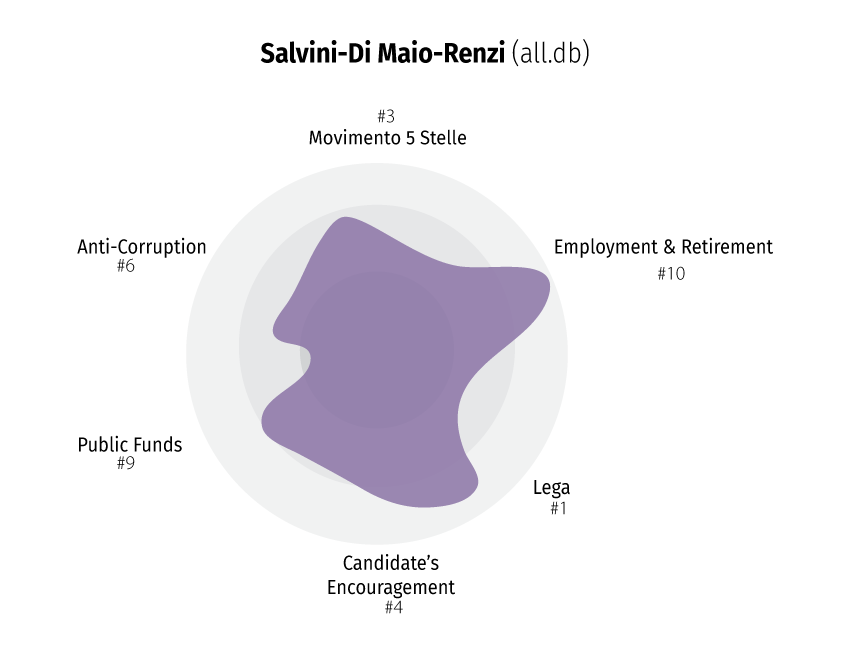
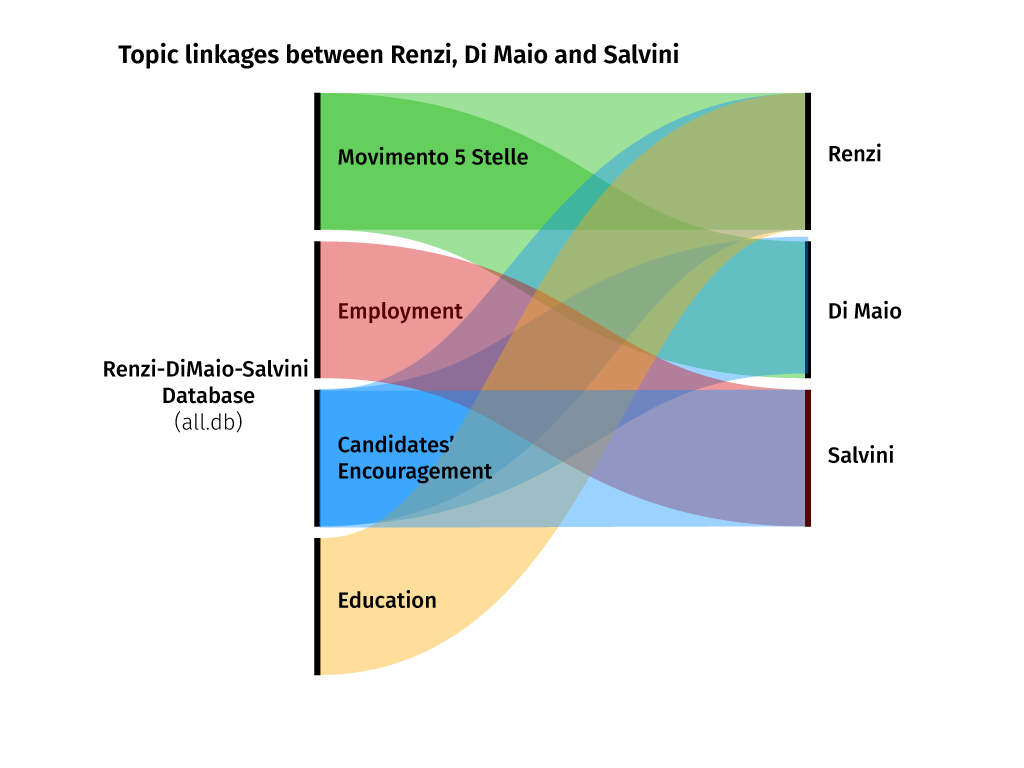
Encouragement of candidates is present in the comment sections of all three political figures. Movimento 5 Stelle was found only in Renzi and Di Maio’s pages. In contrast, Employment and Education are dominant topics only in, respectively, Salvini’s and Renzi’s databases.
CONTINGENCY MATRIX
This contingency matrix visualizes the degree to which each topic is correlated to the comments on each politician’s page. Blue indicates a negative correlation, red a positive one. The darker the color, the more intense the correlation. If there is an “x” on the rectangle, then it is not statistically significant. The “XXXXX” topic represents the three incoherent topics in the overall model.
Unsurprisingly, we see that Salvini has a high correlation with “Lega Nord”, and Di Maio with “Movimento 5 Stelle”. Renzi is most highly correlated with encouragement. While this could be seen as higher appreciation of Matteo Renzi, it has to be noted that among the topics of the comments of his facebook page, very few were linked to the other topics presented in the contingency matrix since they would fall into the XXX category.
As for Education and Public Funds, Renzi’s page would still be the one with the highest correlation: as we have seen in the topic modeling, users were highly concerned by the political and economic reforms on his Facebook page,
As for Employment and Retirement, the highest degree would be reached by Di Maio. The Five Star Movement has strongly opposed the Reform proposed by Minister Fornero and it often talked in his campaign about introducing a minimum wage for citizenship.
Di Maio would have a higher degree for the Anti-Corruption topic as well: the values of the Five Star Movement are based on the opposition to the traditional italian political elite, which is perceived as old and corrupted.
Overall, it is interesting to notice that the topic of Matteo Salvini and Di Maio are highly centered towards their own party and their rhetoric. Since both the Five Stars Movement and the Northern League has been accused by the press of populism, this could show that their supporters mainly repeated the internal discussions and ideas of the party. The lack of discussion and informed debate could also be caused by Facebook, which personalize the posts and the news stream based on customers’ interests.
REACTIONS
Hahas
The “hahas” were particularly interesting - the highest positive correlations were the topics mentioning the politician of the page, the lowest the other two. This suggests there were a number of mocking posts on the pages, or that critics reacted to supporters’ posts often.
Angrys
The only significant correlations were between the polticians and either themselves or their parties. The negative correlation between Salvini and Renzi was also significant.
Wows
Only two boxes were significant: Salvini with immigration, which was positively correlated, and Salvini with economy, which was negatively correlated. This fits in with his platform.
Sads
The sad reactions were particularly interesting. The highest correlation was between Salvini and Renzi/PD, which could be a result of many factors. Perhaps there were a number of pro- or anti-Renzi comments on Salvini’s page that gathered a strong response, or perhaps the comments on Salvini’s page were particularly incline towards talking about Renzi’s government. It is also possible that many of Salvini’s posts were critical of Renzi. Interestingly, only Renzi is positively correlated with sad reactions on Salvini’s page, which would fit with this hypothesis.
It is worth nothing that the other two politicians are negatively correlated with the Renzi topic. The opposite is true for Di Maio - he is moderately positively correlated with the topic about him and his party. This also implies that there were perhaps critical comments on his page, or that his posts indicated that he was feeling attacked.
The last interesting remark about this is the fact that for the topic of taxes, the correlation with Di Maio’s is high: this probably shows the concerns of his supporters towards the topic of taxation.